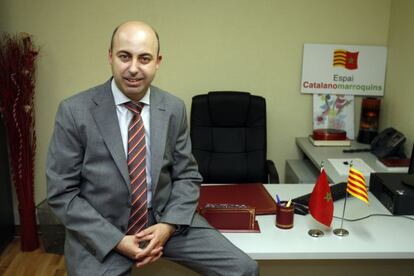Moroccan agent for Catalan party to be deported
Former imam spread sovereignty message and cultivated close links with regional parties

Spain’s intelligence services have ordered the deportation of a Moroccan citizen who was paid by the CDC Catalan nationalist party to fan sympathy for independence among Muslim communities in the region. National Intelligence Center (CNI) director Félix Sanz Roldán accused Noureddin Ziani, a Muslim leader, of “posing a threat to national security [...] and compromising Spain’s relations with other countries,” as stated in the deportation order.
The Moroccan national, who has no criminal record, was informed of the deportation order by Spain’s National Police on May 3. Sources familiar with the case said he spent the night at a Barcelona police precinct, and his lawyer, Fátima Zohra, said the deportation could be made effective at any time beginning on Tuesday.
The deportation order has angered Catalan nationalists, although for now there has been no official reaction from Rabat. “We are incensed at this new maneuver by the CNI,” said Àngel Colom, secretary of immigration for Convergència Democràtica de Catalunya (CDC) and director of Nous Catalans, a foundation that actively seeks to get immigrants to adhere to the Catalan nationalist cause.
“What is the CNI trying to achieve with this deportation of Noureddin Ziani?” wondered this association in a press release issued in Arabic and Catalan. “To strike fear into the hearts of all immigrants who little by little feel closer to the right to decide and to the pro-sovereignty process in Catalonia?” Nous Catalans was created by CDC, and Catalan regional premier Artur Mas inaugurated its headquarters in Santa Coloma de Gramenet in 2012.
Colom knows Ziani quite well. He appointed him director of the Catalan-Moroccan office within his department, and last November both men toured a few of Catalonia’s mosques to preach the virtues of Catalan independence together.
“A Catalan state can bring you greater wellbeing,” the faithful were told.
Ziani, a native of the northern Moroccan city of Oujda who has resided in Barcelona for the last 14 years, is also the longtime president of the Union of Islamic Cultural Centers of Catalonia (UCCIC), a Muslim association that teaches Arabic and provides financial assistance to families, especially during Ramadan. Until recently, it was the second-largest beneficiary of subsidies granted by the Moroccan migration ministry to groups in Spain (158,700 euros in three years).
In fact, Ziani and Colom are so close that Fundació Nous Catalans doubles as the headquarters for UCCIC. For years, Ziani, who was once an imam, acted as the unofficial right hand of the Moroccan consul in Barcelona, Ghoulam Maichane, with whom he used to tour Catalonia and the Balearics to talk to Moroccans living there. Ziani also maintained close ties with the Catalan Socialists (PSC) until this party lost power in the region. When the CDC-Unió bloc (CiU) won the November 2010 elections, Ziani moved closer to CDC.
Rabat is concerned about hypothetical secessions in Catalonia and Scotland, fearing such developments will create new arguments for Western Sahara’s Polisario Front, which seeks independence from Morocco. That is why pro-government media there regularly attack “the opportunists who kindle the secessionist flame.”
Tu suscripción se está usando en otro dispositivo
¿Quieres añadir otro usuario a tu suscripción?
Si continúas leyendo en este dispositivo, no se podrá leer en el otro.
FlechaTu suscripción se está usando en otro dispositivo y solo puedes acceder a EL PAÍS desde un dispositivo a la vez.
Si quieres compartir tu cuenta, cambia tu suscripción a la modalidad Premium, así podrás añadir otro usuario. Cada uno accederá con su propia cuenta de email, lo que os permitirá personalizar vuestra experiencia en EL PAÍS.
¿Tienes una suscripción de empresa? Accede aquí para contratar más cuentas.
En el caso de no saber quién está usando tu cuenta, te recomendamos cambiar tu contraseña aquí.
Si decides continuar compartiendo tu cuenta, este mensaje se mostrará en tu dispositivo y en el de la otra persona que está usando tu cuenta de forma indefinida, afectando a tu experiencia de lectura. Puedes consultar aquí los términos y condiciones de la suscripción digital.








































